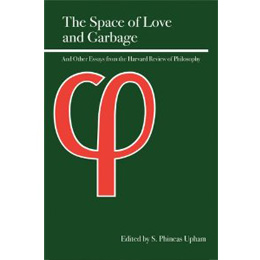The Space of Love and Garbage

By Phin Upham
Building on my work during my time as Editor-in-Chief of the Harvard Review of Philosophy, I worked on a collection of essays called “The Space of Love and Garbage.” Stephen Erickson and Arthur Melzer contributed great essays to the collection; Erickson wrote “The Space of Love and Garbage,” and Melzer wrote “Rousseau and the Modern Cult of Sincerity.”
In “The Space of Love and Garbage,” a title inspired by Ivan Klima’s Love and Garbage, Stephen Erickson further explores his project to understand being in the present—of being open and receptive to understandings that transcends the logical. He draws from Kant and Heidegger to explore the “openness to openness.” Clearing the cluttered “garbage” of everyday life, the unimportant and empty elements, is a worthy goal—though the pursuit of being in the present may itself be a hindrance. In the spirit of Wittgenstein, Erickson tries explores the place philosophy has in clearing this garbage and re-discovering philosophical clarity.
In “Rousseau and the Modern Cult of Sincerity,” Arthur Melzer discusses how sincerity and “being oneself ” has emerged as a core virtue in a modern “culture of narcissism.” How did it come about that sincerity became the only required virtue and hypocrisy the only unforgivable sin? How did acknowledgement of vices become the new virtue? Melzer says, “What piety is for Saint Augustine, what contemplation is for Plato, sincerity is for Rouseau.” Melzer delves into the historic origins of the ideal of sincerity analyzing how sincerity became the goal of the alienated intellectuals, he argues that we are all alienated intellectuals now, and that hypocrisy, Rouseau’s “bourgeois hypocrisy,” has become the vice of modern commercial bourgeois. He analyzes the progression, “today everyone denounces conformity and longs for sincerity . . . everything that once seemed so resolutely anti-bourgeois has now come to light as only late-bourgeois.”
